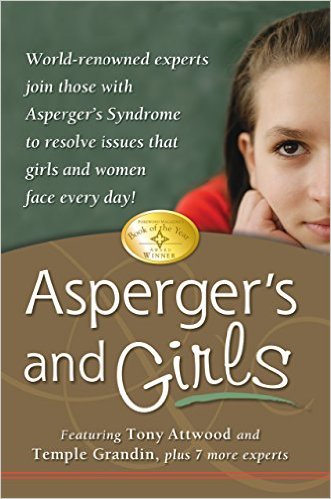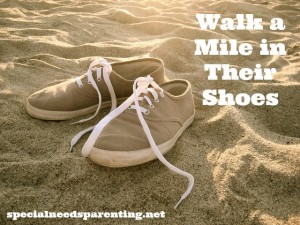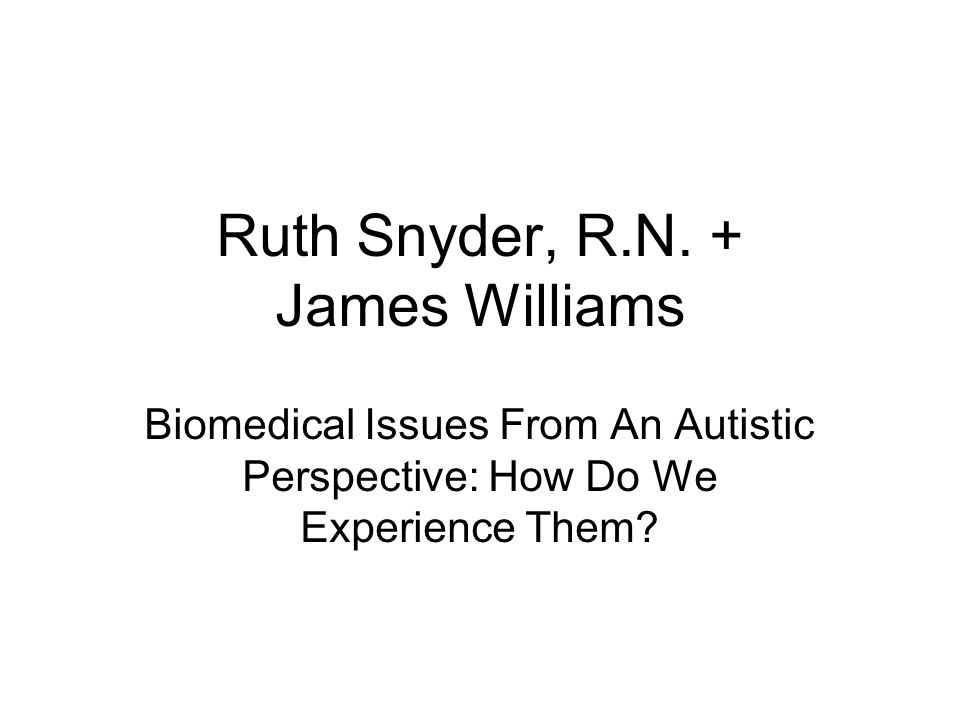We here at TMR feel that everyone benefits when we can look at things from more than one perspective because there is no one person who is in full possession of the truth of anything. We all have our “spin.” Sometimes we identify so strongly with our own perspective that we cannot even imagine what it is like to see another side. This is one of the reasons that TMR publishes so many parental stories. It makes it much easier to “walk a mile in the other person’s moccasins” if you really listen to what he or she has to say. To that end, we are actively seeking different voices to help everyone see both autism and children’s health issues in general from a broader viewpoint than just their own. Ruth Snyder is not only the mother of two children with autism, but she herself has autism. As such her perspective is not only that of an adult with autism, but an adult with autism and the parent of children with autism. As a nurse, she adds a medical understanding of the issues they face. She has partnered with James Williams, another adult with autism, in presentations on Biomedical Issues from an Autistic Perspective.
When my first son was formally diagnosed with autism, I had already known he had autism at least a year before it was confirmed. By the time my second son was diagnosed, I’d had at least two, if not three years of processing the facts and details before his autism was confirmed, medically speaking. When the neurologist gave me the news, his face had that look on it – the look people get when they are about to deliver devastating news. I was familiar with that look from working as a registered nurse for many years and watching doctors let loved ones know that death had come. I was very confused by the neurologist’s somber tone when confirming the diagnosis. This was our third official diagnosis, and I didn’t see anything wrong with autism.
That was more than 10 years ago, when the autism rate was still supposed to be 1 in 10,000. My confusion left me without words, so he began to speak again. When he said “you must have really bad luck,” my confusion disappeared immediately as I replied in a cheerful tone “Oh, no. I know God wouldn’t have given me something like this if He didn’t know we could use it for good.” The doctor seemed confused, but responded pleasantly. I had a perspective that he knew many did not share.
I had learned about autism not so much as a parent but as an individual with autism. A month after my first son was diagnosed by a physician friend, my friend pointed out that I, too, was autistic. He explained, “It is why you never saw anything wrong with your son.” That made perfect sense. We spent the first couple of months re-evaluating my life, especially the medical aspects, confirming my medical diagnosis and revealing all the times I was mistreated medically because of the core deficits of autism: communication, socialization, and behaviors.
For years, lights continued to go on for me, revealing more facets of myself and removing confusion over many dark issues of my past. With the light came understanding, and the issues no longer hurt or had the power to influence my behavior. I was thankful, happy, and even proud to be autistic! I told people it was like finally having a pair of shoes that fit; now I could comfortably walk forward in life.
My enthusiasm often created problems with others, especially other parents. So I opted out of nationally known, long-standing autism groups and found the few hidden self-advocacy groups and joined them, even helped start some efforts, especially in the political arena. I lived in Virginia at the time, and our family was mostly located in the Midwest. I decided that I was ready to move back and accept help. Now that I knew what we were and what we needed, I thought it would be easy. To my surprise, I found it was more like moving back 50 years in time, and the darkness became too prominent to ignore.
 Within the first year or two, the joy that I was filled with – the light that radiated out of me – did help create some positive sparks, but mostly created more confusion for me. For example, I was offered a chance to be featured in the first ever book about girls with autism, Asperger’s and Girls. I had to accept that they made a political choice to call it “Asperger’s” because “autism” was too negative – as was the reality of my “normal” life. Even though I hated how easily people can substitute words, I knew that was due to the autistic wiring in me and worked through it. I had already learned enough to realize that this “black or white” thinking of mine is an autistic trait that had created too many problems for me already to let this opportunity pass by over a single word. I worked through my discomfort with the word change faster than ever before.
Within the first year or two, the joy that I was filled with – the light that radiated out of me – did help create some positive sparks, but mostly created more confusion for me. For example, I was offered a chance to be featured in the first ever book about girls with autism, Asperger’s and Girls. I had to accept that they made a political choice to call it “Asperger’s” because “autism” was too negative – as was the reality of my “normal” life. Even though I hated how easily people can substitute words, I knew that was due to the autistic wiring in me and worked through it. I had already learned enough to realize that this “black or white” thinking of mine is an autistic trait that had created too many problems for me already to let this opportunity pass by over a single word. I worked through my discomfort with the word change faster than ever before.
For the most part, I have learned to switch out words or phrases such as anything with the word “death” when in a conversation with most people. As an RN, I never got that, even as a bereavement specialist. The diagnosis of autism helped me see the problem and the solutions. The word “death” is too harsh for most people to hear, and I need to use “expired” or “passed.” Learning things like this confirmed and continued to feed my “joy” of knowing why I was the way I was.
With this faith and joy, I decided I had enough strength and courage to go meet some parents and share with them at the AutismOne conference in Chicago in 2006. I had no fear, but I also knew I would have one friend and fellow advocate at the conference to meet up with. Lack of fear, also a common trait in many autistics, has served me well most of my life, but realizing that I lack fear, and learning what it physically feels like, has also saved my life since.
As an autistic, being rejected by other autistics can be very painful. Before going to the AO conference I had already been rejected by a popular “self-advocacy” group leader who had asked me about the vaccine issues related to autism. I was clueless about the subject, but very curious to know more. The reasons were personal and scientifically sound. I gave him my honest answer, “I am curious to learn more about it.” My communication skills were not yet improved enough, or perhaps my processing just wasn’t up to speed, for me to recognize that when he asked “What do you think about the vaccine conspiracy issue?” he was also giving me his opinion: conspiracy theory.
I probably would have changed my answer if I had known I was being interviewed, rather than just having a discussion with another self-advocate – what I often call a “sibling in the spectrum.” I have since come to realize that most people seem to be interviewing rather than discussing, and it is only after that rejection, or at least non-acceptance, that I understood my own communication problem. A similar situation occurred at the conference when I met a vendor who was willing to listen to me as a self-advocate. It took over six months for me to figure that one out, and now, nine years later, I consider this person an ally, perhaps a friend.
On occasion, when I go to these conferences, I still feel like I am the “enemy” that they are trying to rid the world of. I am autism and they need to cure, combat, and recover from it. My heart hurts often, and then I have to self analyze: is this emotional pain or physical pain? It’s kind of funny because I now realize that if I don’t ask myself this, I won’t get medical treatment when I need it. That’s because of how bad health care as a business has become. I am so tired of it all that some days I want to quit everything autism, but it’s kind of hard to quit it when you are it.
 Fortunately, I have learned so much from these biomedical warriors that I realize the key word in my sentence is “tired.” When I am tired, I don’t function as well. Whether it is from fibromyalgia, or some other, not-yet-understood diagnosis, or a busy day, I can’t let it control me. I have a choice: go rest or go forward. And I’m not going to let the desire to quit be the thought I hang onto. Unlike other moms, I can’t just call in help and take a break from autism, because it is how my brain and body is wired too. Like other moms, I know how few really “get it” when it comes to raising these amazing kinds of children.
Fortunately, I have learned so much from these biomedical warriors that I realize the key word in my sentence is “tired.” When I am tired, I don’t function as well. Whether it is from fibromyalgia, or some other, not-yet-understood diagnosis, or a busy day, I can’t let it control me. I have a choice: go rest or go forward. And I’m not going to let the desire to quit be the thought I hang onto. Unlike other moms, I can’t just call in help and take a break from autism, because it is how my brain and body is wired too. Like other moms, I know how few really “get it” when it comes to raising these amazing kinds of children.
It is difficult to accept things if we don’t understand them. It is impossible to change things if we don’t understand what the problem is. When I first tried to research autism it was in 2000, maybe 2001. I heard someone mention their son had autism but they could not tell me what autism was. To me, that was as crazy as saying “I have a newborn baby” and not being able to say if it was a boy or a girl. The Internet, books, and the professionals I knew had similar blank responses, accompanied by a very sad look. They reminded me of the movie Rainman but still did not answer the question, just gave the one example. I decided to meet other people with autism, and I understood them better than anyone else in my life. Still, I couldn’t see anything “wrong” or what autism is because I am autistic. It took a medical professional looking with me to help me recall the information our family tried so hard to bury. The truth did set me free!
The conflict is this: if autism is wrong and I am autistic, then according to logic I am “wrong” or “a disease.” But I see it as no different than being left-handed in a right handed dominant world: neurologically diverse.
Having four children, two with autism, has definitely helped me become less self-absorbed or off in my own world and has helped me want to be a part of this world we are all living in, but it hasn’t magically or medically cured me of autism. When my health is at its best, I pass very easily as just another mom in the crowd, which has enabled me to observe and learn what the majority of other self-advocates don’t seem to grasp. I think they, like neurotypicals (NTs) as well, believe that if you can’t get something, then that something is not worth trying to obtain. They’ll decide they don’t really want or need what’s on the “other side.” That kind of black-and-white thinking doesn’t help any of us.

To view the slideshow of this presentation click, here.
Being able to go to these biomedical conferences has helped in ways that so many on the spectrum may never appreciate if we don’t learn to work together. Today, before I wrote, this I found myself at the hospital with my son. I was in tears, tears of joy and pain, emotions all over, thankful for the progress and the knowledge I had that gave me the strength to persevere. My youngest son, with autism, has always had gastrointestinal issues that the world wants to dismiss as “mental,” and I know there is a physical basis. I have met Dr. Andrew Wakefield, the gastroenterologist, and had many different discussions with him. He was the first one to mention a pill cam. We finally have a doctor in our community that knows what it is and uses it! My son’s issues were finally medically confirmed today! A diagnosis is to follow, a name for his pain and problem . . . not for him.
Healing can only begin when you know what the issue really is. If you don’t, then the enemy will convince you it’s your choice to be this way. I choose to acknowledge that I have autism because it helped me understand me, which is helping my children and I in many ways. One of those ways is letting us get closer to obtaining appropriate medical care. Another is getting closer to other amazing parents, both on the spectrum and not.
Having children inspired and motivated me to become a better person in the areas of career, financial goals, normal stuff. But having autistic children has made me not only want to be a better person, but also help the world become a better place for all our children, now and in the future.
~ Ruth Snyder, R.N.


















Ruth, I thank you for boldly sharing your story here.
I first met Ruth at the AutismOne conference many years ago. I had heard about her in 2006, when I purchased a copy of the book “Asperger’s and Girls.” I read her story in the anthology and was proud that she shared her story. One of my best friends is a girl on the autism spectrum, and she’s had a story similar to Ruth’s. Her story enabled me to help become a better friend to her.
Like Ruth, I have had my own share of rejection from other self-advocates with autism. Ruth has been one of the few self-advocates that has been there by my side and respected my work, and in return, I respect her work and advocacy. I am proud to be able to work with her the way that I do.
James
One more thought… you mention
“When I am tired, I don’t function as well.”
have you looked into mitochondrail function and autism?
I have some links on my blog if you are interested.
thank you for sharing your perspective and so much of yourself and your experiences….
thank you also for not discounting the “medical” aspect of autism that comes along with the diagnosis for so many, but that is ignored my so many in the medical community.
I wish you and your family a healthy journey!
hope to meet you one day!
Thank you TMR!
Thank you for this - what a wonderful perspective and yes, love building bridges.
That is so sweet of you, this is going to be a beautiful, firm, and functional bridge too!